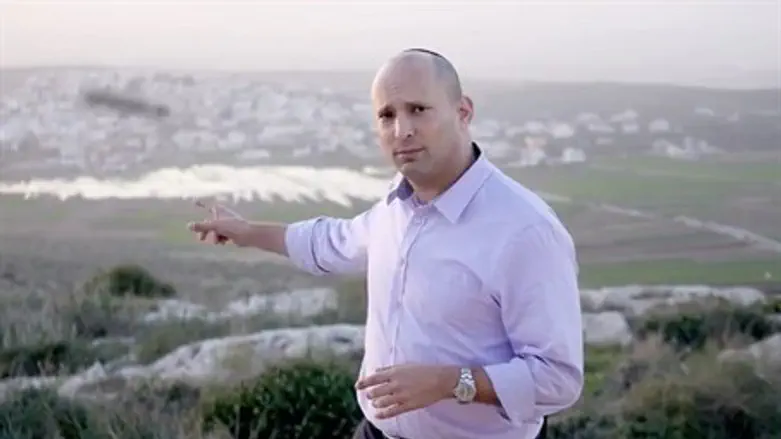
Education Minister Naftali Bennett, Chairman of the Jewish Home, hinted Monday in a Facebook post that the IDF's retreat from the self-declared Security Belt in southern Lebanon may have been a mistake.
The retreat took place on May 24, 2000 – precisely 15 years ago Sunday. It was preceded by 15 years in which the IDF maintained the security belt, to which it withdrew in 1985, after holding on to an even larger swathe of Lebanon from 1982. Bennett served in the elite Maglan and Sayeret Matkal units at the time and took part in numerous operations in Lebanon.
"Unlike other wars,” he wrote, “this long war did not receive a name, and had no decoration. The slogan that hung at every outpost was – 'The goal – protection of the residents of the North.'”
"Overall, we carried out the mission,” he added. “There was security in the North. Most of the firefights with Hezbollah were deep in the territory and not on the northern border. I do not remember infiltrations into Israel, and soldiers were not abducted. Most of the time, Hezbollah was on the defensive, because we attacked it ceaselessly.
"But there was an ongoing price, of the loss of IDF soldiers, and there was media and public pressure to withdraw the IDF from Lebanon.
"In 2000, the government unilaterally withdrew the IDF, while partially abandoning our allies, the South Lebanon Army fighters. This abandonment was a terrible thing.
"Since the withdrawal, we have suffered abductions, we experienced a war with 165 Israelis killed, and Hezbollah has become much stronger. Today, this organization constitutes a meaningful threat to the entire territory of the state of Israel.
"Was withdrawing the IDF from Lebanon the right decision? The question is not an easy one and I will not answer it here. Should Israel risk its soldiers' lives to prevent its enemies from amassing strength at its borders? The answer to that is yes.
"As a member of the Cabinet, I deal with the northern front as much as I can, and I will not ease up on this. I predict that this front will occupy our attention in the near future and we must not rest easy on this matter.
"But in any case, you, the parents, siblings and children of those who were killed in the war without a name: we will never forget your loved ones. Never.
"And one last thing. [Hezbollah chief Hassan] Nasrallah likes to boast that 'the resistance will defeat the Zionists in the end.' That won't happen. The Nation of Israel is an eternal one. We were here 3,800 years before you, and we will be here long, long after you and your buddies will be forgotten.”
100,000 rockets aimed at Israel
The retreat from Lebanon was carried out by the government of Ehud Barak. The main force pushing for the retreat was a small group named Four Mothers, which was turned into a prominent political force by Shelly Yechimovich, then a dominant figure in the news desk of Kol Yisrael public radio. Yechimovich and the Four Mothers presented the logic behind the demand to withdraw as being a peculiarly feminine and pacifistic one, as opposed to the "macho" and militaristic logic of those who opposed it.
Hezbollah is now believed to have 100,000 rockets aimed at Israel. This means an all-out war could involve hundreds or thousands of Israeli casualties. On the other hand, such a war could also involve Israel striking Lebanese infrastructures in a way that would throw the country into complete dysfunction.
After Nasrallah threatened in November that Israel would have to close down the Ben Gurion Airport and the Haifa port in case of war, Likud Minister Yisrael Katz replied on his Facebook page: “In order to avoid any doubt on the matter, Nasrallah the cowardly braggart should know this: that option does not exist for us. If such a scenario does materialize, we will raze Lebanon to the ground! We will return it to the Stone Age and bury [Nasrallah] under the rocks."
Analysts have also pointed to Israel's hurried withdrawal from southern Lebanon and the weakness it projected as a trigger for then-Palestinian Authority chief Yasser Arafat's decision to launch the deadly terror war known as the Oslo War or the "Second Intifada" four months later. That war lasted years and cost the lives of about 1,500 Israelis, most of them civilians.